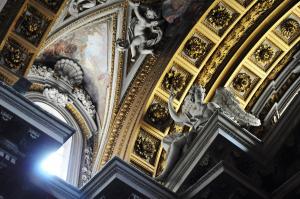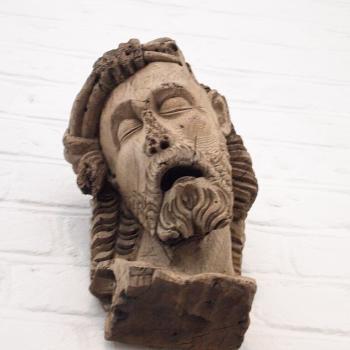 God’s presence is manifest as the kingdom of heaven; because of this he is called King of Kings and Lord of Lords. He establishes the kingdom through his divine authority. In a sense, a kingdom and the one who presides over it are one and the same, for without the presence of the king the kingdom is no longer a kingdom. This is how and why kingship and kingdom are represented by the Greek, βασιλεία (basileíā ), with the king being the one who holds the seat of authority in the kingdom. The kingdom of God is found in the reign of God. God therefore is called βασιλεία, at once showing he is the king or authority and through him and his presence, the kingdom of God is discerned. Yet, in this way, the two are interdependent. Without a kingdom, there is no king, and without a king, there is no kingdom. Someone is king so long as they have a kingdom over which they exercise authority. The kingdom of God requires more than God for its existence. Kingship is contingently developed and discerned. God, however, is not a contingent being; there is nothing contingent in regards to who or what he is. For this reason, Dionysius, in bringing us further into the reality of God, asserted that in the absolute truth of God, we are to see God transcends any notion of kingdom and kingship, hence he asserted that we are to say “nor kingdom” (βασιλεία) as being appropriate to God as he is in himself. It too must be denied because the notion of kingship, and with it the kingdom of God, is derivative in nature, as it explains how God we understand God in relation to his activity with the created order and the eschaton.
God’s presence is manifest as the kingdom of heaven; because of this he is called King of Kings and Lord of Lords. He establishes the kingdom through his divine authority. In a sense, a kingdom and the one who presides over it are one and the same, for without the presence of the king the kingdom is no longer a kingdom. This is how and why kingship and kingdom are represented by the Greek, βασιλεία (basileíā ), with the king being the one who holds the seat of authority in the kingdom. The kingdom of God is found in the reign of God. God therefore is called βασιλεία, at once showing he is the king or authority and through him and his presence, the kingdom of God is discerned. Yet, in this way, the two are interdependent. Without a kingdom, there is no king, and without a king, there is no kingdom. Someone is king so long as they have a kingdom over which they exercise authority. The kingdom of God requires more than God for its existence. Kingship is contingently developed and discerned. God, however, is not a contingent being; there is nothing contingent in regards to who or what he is. For this reason, Dionysius, in bringing us further into the reality of God, asserted that in the absolute truth of God, we are to see God transcends any notion of kingdom and kingship, hence he asserted that we are to say “nor kingdom” (βασιλεία) as being appropriate to God as he is in himself. It too must be denied because the notion of kingship, and with it the kingdom of God, is derivative in nature, as it explains how God we understand God in relation to his activity with the created order and the eschaton.
According to the Divine Names, “Kingdom is the assignment of every limit and order, and ordinance and rank.”[1] There is, however, no limit, order or rank in God as he is in himself; he is the one who establishes order while he beyond all sense of established order. There is no limit to God. There is no ordinance which has authority or rule over God; what he wills, he establishes. Likewise, then, as Thomas Gallus indicated, God’s authority is not something secondary to him as wrote: “nor kingdom, because he cannot be made into a ruler.”[2] God’s authority is not something which is made and established for God by some external force; he does not inherit authority, but rather, he establishes it; the kingdom of God is God, and when we experience the kingdom of God, we experience God, but not God as he is in himself but God as he acts with us and establishes his presence with us through his grace. As we experience God, we come to see God in and through the means by which he reveals himself to us and it is there we find the kingdom of God. The kingdom of God truly is established by God even as it reveals God.
Likewise, Dionysius then denied one of the key titles and designations for God: wisdom, writing after his denial of titles related to kingship and authority, nor wisdom. Once again, the name of Wisdom is appropriate for God because it relates to his activity in relation to creation: “For the LORD gives wisdom; from his mouth come knowledge and understanding” (Prov. 2:6 RSV). God is the source of wisdom, the source and foundation for all truth and knowledge, as he is the creator who established all things in his creative will. This is how Dionysius explained the title of Wisdom for God in the Divine Names:
But, since the Divine Wisdom is called source, and cause, and mainstay, and completion and guard, and term of wisdom itself, and of every kind, and of every mind and reason, and every sensible perception, how then is Almighty God Himself, the super-wise, celebrated as Mind and Reason and Knowledge? For, how will He conceive any of the objects of intelligence, seeing He has not intellectual operations? or how will He know the objects of sense, seeing He is fixed above all sensible perception? Yet the Oracles affirm that He knoweth all things, and that nothing escapes the Divine Knowledge. But, as I have been accustomed to say many times before, we must contemplate things Divine, in a manner becoming God. For the mindless, and the insensible, we must attribute to God, by excess—-not by defect, just as we attribute the irrational to Him Who is above reason; and imperfection, to the Super-perfect, and Pre-perfect; and the impalpable, and invisible gloom, to the light which is inaccessible on account of excess of the visible light. So the Divine Mind comprehends all things, by His knowledge surpassing all, having anticipated within Himself the knowledge of all, as beseems the Cause of all; before angels came to being, knowing and producing angels; and knowing all the rest from within; and, so to speak, from the Source Itself, and by bringing into being.[3]
God knows all things in and through himself; he knows them because he establishes them as all things are made in and through him. This is what is meant by calling him Wisdom:
The Divine Wisdom then, by knowing Itself, will know all things; things material, immaterially, and things divisible, indivisibly, and things many, uniformly; both knowing and producing all. things by Itself, the One. For even, if as becomes one Cause, Almighty God distributes being to all things that be, as beseems the self-same, unique Cause, He will know all things, as being from Himself, and pre-established in Himself, and not from things that be will He receive the knowledge of them; but even to each of them, He will be provider of the knowledge of themselves, and of the mutual knowledge of each other.[4]
Robert Grosseteste, in interpreting Dionysius’s rejection of the term wisdom for God wrote: “nor wisdom, that is, the privation of error in acting, which is wisdom in the highest sense of the word.”[5] Those who are wise are known for sound, sensible opinions, providing good judgments. They reason out from what they know with prudence. But, they still come out lacking and can still be in error despite all that they know and how good their use of reason is. This is why those who are wise can appear foolish as their wisdom fails them and their judgments are shown to be full of grave faults. All we need to do is examine the understanding of many philosophers in regards the material sciences, and we will find many good, sound opinions based upon what little knowledge they possessed, and yet so far off from the truth that we would be foolish in following them in their wisdom. God, however, has no error in his action; he acts without error; he does not guess, and so there is in this sense, no wisdom in God but the transcendence of wisdom because he cannot err. God does not need to engage in prudential judgments: he is beyond them with his knowledge.
God establishes all things, gives them their nature and qualities, establishing the things which can be and are to be known; he knows them through himself, and not through some secondary observation. In this sense, he can be said to know all things, but he does so, not in the ordinary ways of knowing which we engage, but with his own transcendent sense as he establishes what is to be known in and through himself. Likewise, he is wise, but not in the way which we normally conceive: he is more than wise, more than wisdom, he is its foundation. [6] He is not wisdom because he transcends it and establishes it: he establishes the order of creation from which wisdom is derived, both within himself as a divine energy, but also in creation as created principle, a created wisdom, from which our concepts of wisdom are established.
[IMG=Ceiling of old church [CC0 Public Domain] via PxHere]
[1] Dionysius, Divine Names. Trans. James Parker (London: James Parker and Co,, 1897), 120.
[2] Thomas Gallus, “Expossicio” in Robert Grosseteste, “De Mystica Theologia” in Mystical Theology: The Glosses of Thomas Gallus and the Commentary of Robert Grosseteste on De Mystica Theologia. Trans. and ed. By James McEvoy (Parish: Peeters, 2003), 51.
[3] Dionysius, Divine Names. Trans. James Parker (London: James Parker and Co,, 1897), 88-9.
[4] Dionysius, Divine Names. Trans. James Parker (London: James Parker and Co,, 1897), 90.
[5] Robert Grosseteste, “De Mystica Theologia” in Mystical Theology: The Glosses of Thomas Gallus and the Commentary of Robert Grosseteste on De Mystica Theologia. Trans. and ed. By James McEvoy (Parish: Peeters, 2003), 117.
[6] See A Thirteenth-Century Textbook of Mystical Theology at the University of Paris. trans. L Michael Harrington (Paris: Peeters, 2004), 105.
Stay in touch! Like A Little Bit of Nothing on Facebook













